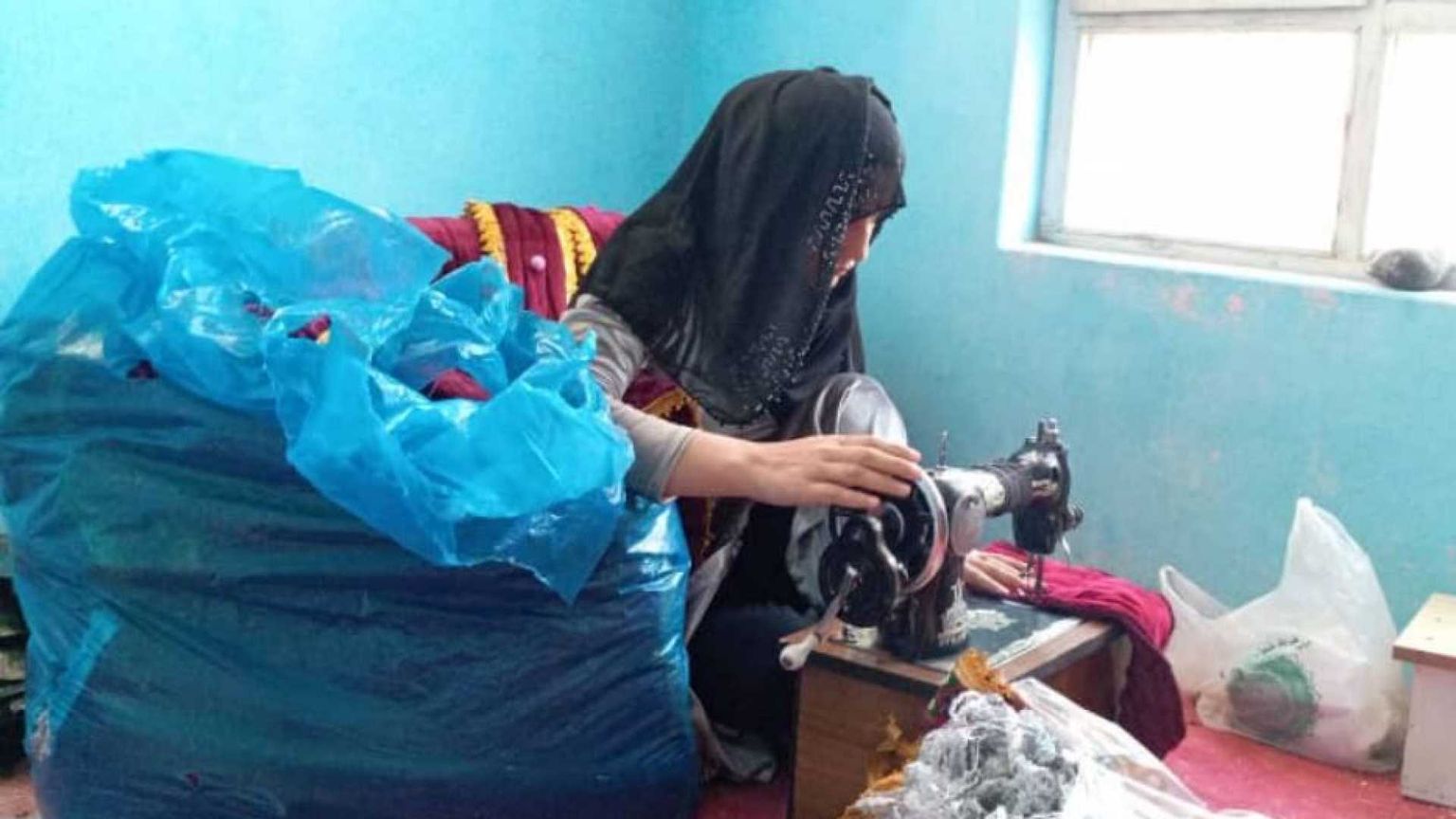From office managers to raising poultry: how women survive under the Taliban
di Redazione
Expelled by the Taliban from most professions, many are forced to sell eggs, sew, or work as maids to feed themselves and their families. «They don’t know how persistent we can be»

Somaya hid the basket of eggs beneath her blue chador as she hurried off to the Yingi Kint market in the city of Sheberghan in Jawzjan province. It is an entirely male domain yet Somaya pushed down her fear to go every day. Her first stop is a small grocery shop of an acquaintance with whom she has arranged to sell her eggs. “I sell each egg for five afghani,” she tells Zan Times. “I sell 30 to 35 eggs a day. Sometimes I go from shop to shop to sell them if my acquaintance doesn’t buy all of them.”
She knows that the Taliban forbid women to roam the market or conduct business openly. So, she doesn’t linger but rushes home as quickly as possible, using the modest egg money to meet her family’s basic needs.
During their three years in power, the Taliban have imposed numerous laws and regulations aimed at severely restricting or prohibiting women’s work. Initially, women were banned from working in government offices; later, they were barred from employment in non-governmental organizations, the United Nations, universities, and even women’s hair salons. With each shrinking of their job opportunities, more and more women have been forced into unskilled, laborious work.
Twelve years ago, Somaya became the head of her family, responsible for her daughter and mother, when her husband died in a traffic accident. This household of three women is unacceptable to the Taliban, who insist that she, like all women, must only venture outside her home in the company of a male guardian.
While Somaya, 44, now finds herself feeding and caring for chickens, she once worked as an experienced manager in the provincial government. “I had experience in my field,” she explains. “People were pleased with my work; everyone respected me. Truthfully, I had never managed a poultry farm; I couldn’t even raise a single chicken. Now I am deeply saddened that I have nothing else to do.”
She once earned around 10,000 afghani a month. Now, she is lucky to earn 4,000 or 5,000 afghani from the makeshift poultry coop she has in the courtyard of her home.
That shift by women to more informal ways to survive is reflected in the data. A year ago, the United Nations Development Programme reported that Taliban restrictions on women had caused the overall employment rate for women in Afghanistan to drop from 11 percent in 2022 to six percent in 2024. Recently, the United Nations Office for the Coordination of Humanitarian Affairs — citing the analytical Ngo Acaps — stated that the number of working women in Afghanistan is disproportionately lower than it was before the Taliban’s return to power.
The Acaps report, published in February, adds that self-employment is currently the only option available to women given Taliban restrictions on female work. The report also notes that the number of registered businesses run by women has quadrupled between 2021 and 2024. Acaps estimates that the number of unlicensed businesses managed by women has more than doubled in recent years.
But such businesses also come with dangers. In June 2022, Zuleikha and her husband were dismissed from their jobs after their office received a warning from the Taliban. Despite the fact that they are both professionals with 15 years of experience working for international NGOs, including Acted and the Aga Khan Development Network. 38-year-old Zuleikha and her husband were unable to find new jobs. So, like Somaya, she set up a chicken coop in her courtyard and began rearing and caring for domestic poultry. The couple, who once earned more than 40,000 afghani a month, now struggle to get 3,000 afghani a month from the sale of their chickens’ eggs. “The chickens lay eggs; my sons and I take care of them, I sell the eggs, and that covers our expenses,” she explains. In addition, Zuleikha’s husband owns a cargo tricycle, which enables him to earn 200 afghani a day.
Their income isn’t enough. “Raising one child is hard; imagine six. We are truly in a difficult situation — I cannot cover their expenses,” she laments.
Zan Times talked with seven women in the provinces of Takhar and Jawzjan who previously held professional positions with governments or NGOs but who are now raising poultry, or doing other labour, such as embroidery or cleaning houses, to survive.
Until November 2024, Shabanam, 32, worked as an instructor at a health education institute in Afghanistan. Now she is a tailor who does beadwork on the cradles of newborns. Though she learned this art from her mother, she never considered it a means of earning a living before. “My husband said, ‘Don’t do this; you won’t manage it,’” she recounts. “But after becoming depressed from unemployment, I insisted that I needed to work and must be independent.” Shabanam sells her products to neighbourhood women, in local bazaars, and to buyers who purchase in bulk and resell them in other provinces.
Married just two years ago and without children, she plans to build a better life for her future family. “This is my struggle. Perhaps the Taliban think they can defeat Afghan women, but they know nothing of our perseverance and art,” she declares, with resolve in her voice.
While Shabanam and her husband are getting by, life is much harder for Golchehra, a 27‑year‑old who now heads a six‑member household. Once a private school manager, she is forced to take any job to put food on the table for her family. Golchehra goes from house to house, washing clothes and cleaning homes for 250 afghani a day. “Some families humiliate me, while others, with sympathy, say, ‘What has become of the girl who was once a manager earning a good salary,’” she says.
She has been harassed by men in some of the houses where she doesn’t know the residents. “The men in these households proposition me for sex in exchange for money, and that deeply upsets me,” she says. “I have bottled up all my feelings. Now I only breathe for my family.” Still, she cannot stop working even though she doesn’t feel safe. “I wish I could find a better job. I try, at least, so that my sisters do not have to face the conditions I am in.”
Pseudonyms are used for the interviewees as well as Nasrin Jawadi, who are female journalists in Afghanistan
Khadija Haidari is a “Zan Times” reporter
Zan Times
, the women’s newspaper, crosses continents: written together by reporters who stayed in the country and those in exile
When the Taliban returned to Kabul on August 15, 2021, Zahra Nader was not in Afghanistan. She had left three years earlier to escape the extremists’ fury, as targeted attacks on journalists intensified. Zahra, a prominent correspondent for The New York Times from the Afghan capital, had become a target. That’s why she decided to relocate to Toronto with her family, where she pursued a PhD in Gender Studies at York University. Even from afar, the fall of the Republic and the establishment of the Emirate was a devastating blow. «I felt a responsibility to do something for the women of my country» she said. Thus, in August 2022, Zan Times—which means Women’s Newspaper—was born, with an all-female editorial team. The online publication is run by Afghan journalists from the diaspora as well as by those who remained in the country and are forced to publish under pseudonyms. The latter group gathers local information, conducts interviews, and produces investigative reports on issues that are uncomfortable for the regime: abuses against minorities, forced marriages, domestic violence, and women’s resistance. It is extremely high-risk work: they risk arrest, physical punishment, and even death. That’s why anonymity is crucial. The articles are produced collaboratively with their exiled colleagues, who support them with research and by tracking their movements to minimize danger. «They inform us every time they leave the house for work, telling us exactly where they’re going and whom they’ll meet. The local journalists don’t know each other, so if any of them are detained, they can’t reveal the others’ identities to the Taliban. We serve as the link between them» explains the founder of Zan Times. To launch the project, she used her personal savings and engaged readers in an online fundraising campaign. The articles are written in English and Farsi, which is similar to Dari—one of the most widely spoken languages in Afghanistan alongside Pashto.
© RIPRODUZIONE RISERVATA







